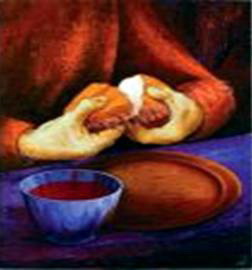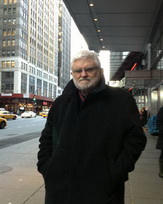A
few days ago, we celebrated the feast of
Corpus Christi
, the feast of the brokenness and
sharing of the Lord himself. It is a feast that has kept its Latin name through
usage, the conciseness of the two words somehow suits the act of breaking of
bread.
It
is an action central to the Christian faith, the fulfilment at the time of
Pasch, pre-figured in the Upper Room, shown to us on
Calvary
and in the Resurrection.
In
the Lion, the Witch and the Wardrobe, C. S. Lewis tells a similar story in
allegorical form where Aslan, the Lion, challenges the perpetual Winter of
Narnia and in the process is broken and apparently defeated, only to return in a
mysterious way, victorious.
This
food for our journey, the sustenance for our lives, this Bread is broken for us
in the Eucharist, there for the taking, there for sharing.
It
is at this time of the year that many young people receive this gift for the
first time. We teach them, we prepare them, we pray with them, but what really
is their perception of the significance of their action? We cannot say. We can
only show by the faithfulness of our own need for the Eucharist that it is
important to our lives and in this way encourage them to join us round the Table
of the Lord.
And
to do so out of need, not as a reward for our supposed goodness. Our lives have
high points and low points, we move from successes to failures, from strong
faith to hesitant doubt, from the brilliant light of day into the darkness of
deepest night. The one constant is the broken body of Christ, our bread of life.
We have only to ask, to make the first move, to stand with opened, upturned
palms waiting for the gift that is Himself.
The
image that heads this posting
Christ
breaks the bread: used
with permission McCrimmons
Publishers UK
http://www.mccrimmons.com/start.php?page=gallery&gallery_id=2650
is
a powerful representation of the sacrament, yet so simple in its substance, the
broken loaf, broken by worn hands, the simple wooden platter on the table and
the cup of wine by its side.
Just
as we are called by our shared humanity to aid those displaced by war and
famine, by fear and drought, so too we are called to take and share in the gift
of Christ himself. One demands the other. In recent months, countless newscasts
have shown families on crowded roads leaving their homes uncertain of their
future, not knowing where they will spend the night or where they will eat their
next meal.
The
forth-coming Synod on the Family must address the issue of sharing in the
Eucharist for those whose marriage has failed on the way. Just at the time when
the journey has got hard, we raise the bar and deny them the Eucharistic Christ
in their brokenness. A Church whose members fall short of the highest ideals
should demand compassion and inclusion for all in spite of their circumstances,
or even more, because of them.
The
United States Conference of Catholic Bishops (USCCB) writing in 2013 said that
“In the face
of the sin and injustice we see present in our communities and in our world, the
Eucharist “plants a seed of living hope in our daily commitment to the work
before us,” challenging us to live “Eucharistic” lives. It affirms our
role as citizens and as men and women in various professions at different levels
of society in “contributing with the light of the Gospel to the building of a
more human world, a world fully in harmony with God’s plan”
The
breaking of bread is an action that changes lives as we share with each other
our faith in the Lord. Take, eat, He has been broken for you.

END


